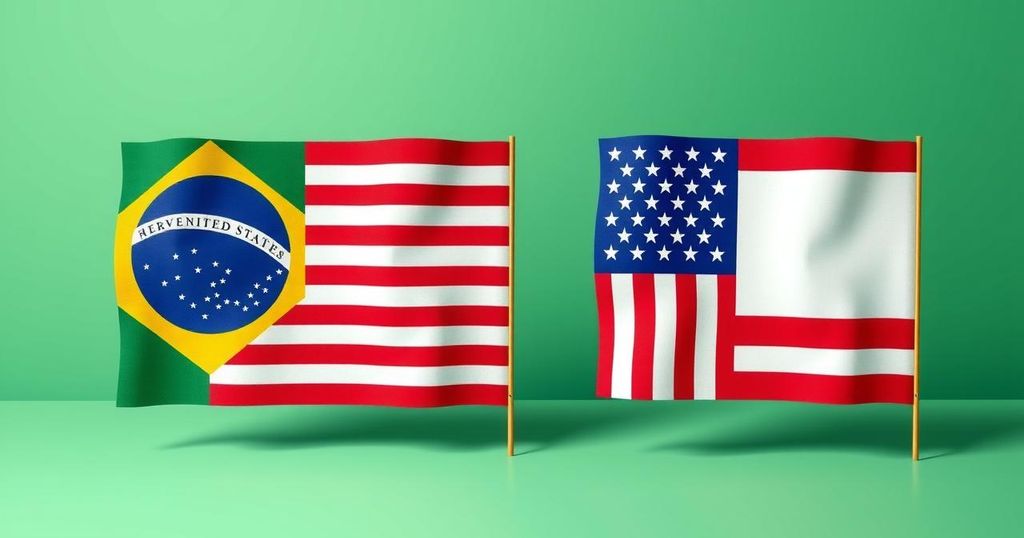World news
AFRICA, ASIA, BO, BRAZIL, CHINA, EUROPE/ASIA, HOUSE, INDIA, IRAN, JAI, JAIR BOSONARO, MEXICO, MONEY LAUNDERING, NATIONAL SECURITY, NORTH AMERICA, POLITICO, POLITICS, R - CALF USA, RIO DE JANEIRO, RUSSIA, SOUTH AFRICA, SOUTH AMERICA, SUPREME COURT, TRADE RELATIONS, TRUMP, U. S, UNITED STATES, WHITE HOUSE, WILBUR ROSS
Ethan Kim
0 Comments
President Trump Announces 50 Percent Tariff on Brazilian Goods
- President Trump implemented a 50 percent tariff on Brazil starting August 1, 2025.
- The tariff targets Brazil’s treatment of former President Jair Bolsonaro.
- Brazil’s censorship orders on U.S. companies motivated the tariff increase.
- Some analysts view the tariff as a reaction to international discontent.
- Supporters argue the tariff will protect U.S. cattle producers from Brazilian imports.
Trump Takes Hard Stance on Brazil with New Tariff Policy
In a bold move that could reshape trade dynamics, President Trump has announced a staggering 50 percent tariff on Brazilian goods set to take effect on August 1, 2025. This significant tariff increase comes just a few months after he imposed a 10 percent duty as part of reciprocal tariffs in April. The announcement was made public via social media, where President Trump shared a letter addressed to Brazilian President, showcasing his administration’s discontent with Brazil’s treatment of its former leader, Jair Bolsonaro. Notably, Trump’s letter does not shy away from accusing Brazil of undermining free elections and the fundamental rights of American free speech, citing what he described as countless unlawful censorship orders from the Brazilian Supreme Court.
Unpacking the Reasons Behind Trump’s Tariff Increase
Trump’s discontent stems from Brazil’s perceived disregard for U.S. interests, especially in light of alleged censorship practices affecting American social media platforms. The letter explicitly mentions Brazil’s threats to fine and evict U.S. companies from its social media market, reinforcing the concern that this tariff is more than just an economic measure; it is a political statement. Experts suggest that this escalated tariff could be a direct response to Brazil’s alignment with a coalition of emerging economies that have openly criticized U.S. military actions and Trump’s initial tariff initiatives. Some analysts argue this coalition’s commentary may have provoked Trump to escalate his retaliatory measures against Brazil.
Mixed Reactions and Future Implications of the Tariff Policy
Responses to Trump’s tariff have been varied, with some critics labeling it as an overreach and absurdity in international diplomacy. Paradoxically, supporters argue that the measure is necessary to protect the domestic cattle industry from being overwhelmed by Brazilian beef imports. Bill Bullard, CEO of R-CALF USA, expressed robust support, stating that the current tariffs are insufficient and contribute to the struggles faced by American farmers. Bullard noted that the 26.4 percent over-quota tariff is too low to deter Brazilian beef imports, thereby threatening the domestic food supply chain. With ongoing legal challenges anticipated regarding the tariff, legal experts point out that previous court rulings have often favored Trump’s administration and could influence the outcome of any future litigation.
In summary, President Trump’s announcement of a 50 percent tariff on Brazilian goods marks a significant escalation in trade relations, likely tied to broader concerns about free speech and election integrity. The move has received mixed reactions, showcasing a divide in how such policies are viewed both domestically and internationally. As legal challenges loom, the real impact of this tariff will depend on the judicial system as well as ongoing economic and political dynamics between the U.S. and Brazil.




Post Comment